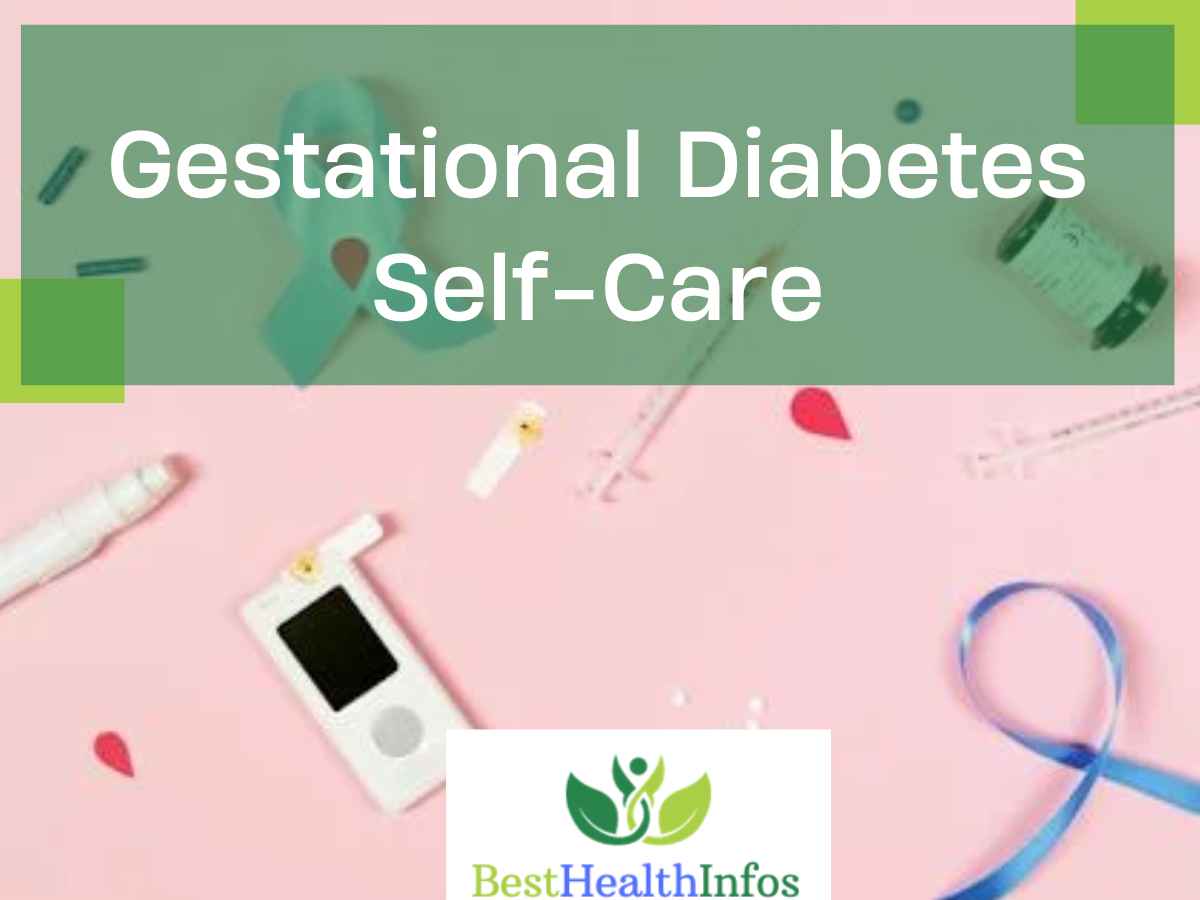Expecting a baby is an exciting journey, but it comes with responsibilities. One aspect that demands attention is gestational diabetes self-care. Managing it through self-care enhances your pregnancy experience. This condition requires diligent efforts, but you can adequately elevate your well-being and your baby’s health.
Also Read: 10 Health Benefits of Rainier Cherries
Adopting a proactive approach empowers you to navigate this temporary challenge. Embracing healthy habits and regular monitoring become your allies. Elevating your pregnancy experience involves not just medical care but also self-awareness. Let’s delve into the realm of gestational diabetes self-care to ensure a smoother and more gratifying journey to motherhood.
What is Gestational Diabetes Self-Care?
Gestational diabetes self-care is about taking charge of your health during pregnancy. It is about understanding the importance of managing high blood sugar levels that kick-start during this time. This means committing to a well-balanced diet of fruits, vegetables, lean proteins, and whole grains. It’s about consciously reducing the intake of processed foods high in sugar and unhealthy fats.
Incorporating daily physical activities like walking or prenatal yoga also plays a pivotal role. Moreover, routinely checking your blood glucose levels can help monitor the situation. Regular visits to your healthcare provider are non-negotiable to ensure your baby’s well-being. With gestational diabetes self-care, you’re not only looking after your health, but you’re also shaping a healthier future for your little one. It’s about embracing a proactive role, and yes, you’ve got this!
Also Read: Roemheld Syndrome: Hidden Health Issues
How is gestational diabetes managed?
Managing gestational diabetes may seem overwhelming, but remember, you’re not alone! Here’s how you can skillfully handle this journey:
- First, understand your unique glucose goals. Every pregnancy is different, so your healthcare provider will give you personalized targets.
- Embrace a balanced diet. Opt for foods low in sugar and high in fiber and protein. Portion sizes matter, too.
- Incorporate regular physical activity. Exercise can be a great ally to reduce blood sugar levels. Always consult your doctor before starting a new routine.
- Monitor your blood sugar. This is crucial to ensure you’re on track. Record your readings to discuss with your doctor.
- Take medication if prescribed. Sometimes diet and exercise aren’t enough, and medicine is needed.
- Attend all medical appointments. Regular check-ups allow early detection of potential complications.
It’s your journey. You’re the captain. Embrace it with positivity and patience!
Also Read: What are Sperm Cramps?
What causes gestational diabetes?
Unveiling the causes of gestational diabetes is akin to solving a complex puzzle. There’s no one-size-fits-all explanation but several potential culprits.
- Pregnancy hormones are the first suspect. These hormones can trigger insulin resistance, leading to higher blood sugar levels.
- The placenta, your baby’s lifeline, could be a player. As it grows, it secretes hormones that can interfere with insulin effectiveness.
- Another critical factor is the body’s inability to produce extra insulin required during pregnancy.
- A history of gestational diabetes in previous pregnancies might also set the stage for a recurrence.
- Being overweight or obese could increase your risk, along with a family history of type 2 diabetes.
- Certain ethnic groups, including African Americans, Asian Americans, and Hispanics, show higher prevalence rates.
Though these are potential causes, it’s crucial to remember that gestational diabetes can strike anyone. Awareness is your first line of defense.
What Are the Risks of Gestational Diabetes?
Gestational diabetes doesn’t just knock on your health door; it carries many risks. Let’s uncover them:
- Baby’s size could grow excessively, making delivery more challenging.
- High blood sugar levels may lead to early labor or trigger a C-section.
- The baby might experience low blood glucose (hypoglycemia) just after birth.
- There’s a risk of your baby developing type 2 diabetes or obesity later in life.
- You may face an elevated risk of developing type 2 diabetes post-pregnancy.
- Preeclampsia, a potentially serious pregnancy complication, may rear its head.
- Future pregnancies may likely involve a gestational diabetes rerun.
However, remember, these are ‘risks,’ not ‘certainties.’ With a well-managed gestational diabetes self-care plan, these risks can be significantly minimized.
Checking Your Blood Sugar
Monitoring your blood sugar is your secret weapon against gestational diabetes. But how exactly do you go about it? Don’t worry, it’s simpler than it sounds! You’ll need a blood glucose meter available at any pharmacy. These handy devices include a lancet to prick your finger and test strips to measure your glucose levels.
Usually, you’ll check your blood sugar four times daily: first thing in the morning (fasting) and after each meal. Your healthcare provider will guide you on your personalized targets. Record your results diligently, as this log becomes a vital conversation tool with your doctor. Regular checks equip you with real-time insights and empower you to take immediate action if levels spike. The power is literally in your hands!
Also Read: Simple Steps to Naturally Prevent Breast Cancer
Visits and Tests for You and Your Baby
Navigating through gestational diabetes means regular check-ups and routine tests:
- Your healthcare provider will schedule more frequent visits. These appointments are your golden opportunity to discuss concerns and track progress.
- Expect routine blood tests to monitor your blood sugar levels. These tests provide essential data to tailor your self-care plan.
- Your doctor might suggest a Glucose Tolerance Test (GTT) to evaluate how your body handles sugar.
- Ultrasounds become your window into your baby’s world. They monitor your baby’s growth, ensuring everything develops just as it should.
- Non-stress tests might be scheduled in the third trimester. These monitor your baby’s heartbeat, responding to their movements.
Remember, every test has one ultimate goal: to keep you and your baby healthy and happy. So buckle up, embrace this journey, and enjoy the unique bonding experience each test brings!
After Your Delivery
Congratulations, mama! You’ve successfully navigated pregnancy with gestational diabetes. Now, what next after delivery?
- First, breathe a sigh of relief. Often, blood glucose levels return to normal postpartum.
- But stay vigilant. Remember to check your blood sugar levels regularly.
- Schedule your postpartum check-up around six weeks post-delivery.
- Use this appointment to discuss postnatal care, breastfeeding, and contraception.
- Remember to ask your healthcare provider for a diabetes test.
- Keep your healthy habits alive. Maintain a balanced diet and regular physical activity.
- If you’re breastfeeding, you’ll need extra calories. Seek guidance from a nutritionist.
- Most notably, take time to bond with your newborn. Embrace this particular time.
Your journey continues after delivery. Gestational diabetes self-care continues, paving a path for your long-term health and wellness.
Follow These Instruction Gestational Diabetes At Home
Navigating gestational diabetes at home? Let’s chart a road map together:
- Make ‘balance’ your buzzword. An equal mix of proteins, whole grains, fruits, and vegetables should grace your plate.
- Portion control is paramount. Avoid large meals; opt for smaller, frequent ones.
- Get moving. Choose a physical activity you enjoy, whether walking, swimming, or prenatal yoga.
- Keep a close eye on your blood sugar. Make your glucose meter your new best friend.
- Maintain a glucose log. Record every reading diligently.
- Have you got prescribed medication? Take every dose.
- Hydration is crucial. Keep water within arm’s reach always.
- Take mini-breaks throughout the day. Rest when you need to.
Remember, your home is your sanctuary. Make it a haven for gestational diabetes self-care!
How will gestational diabetes affect me in pregnancy?
Navigating pregnancy with gestational diabetes can feel like a roller coaster, but it’s manageable. Here’s what to expect:
- Frequent fatigue and exhaustion may be your new companions. Your body works extra hard to manage blood sugar levels.
- You might encounter increased thirst and urination. This is due to your kidneys trying to eliminate excess glucose.
- Hunger pangs might turn up uninvited. High blood sugar prevents your cells from getting the energy they need, sparking cravings.
- Nausea and vomiting may become more frequent, especially in the mornings.
- Blurred vision can be a concern due to high blood sugar levels affecting your eyes.
- Despite all these, you may also experience days of feeling fine. Pregnancy with gestational diabetes is a mixed bag, and every woman’s experience is unique.
Remember, each symptom is a signal from your body, reminding you to take charge of your health. Listen to it, nurture it, and make gestational diabetes a manageable part of your pregnancy journey.
Importance of Regular Monitoring of Blood Sugar Levels
Checking your blood sugar levels regularly is crucial to managing gestational diabetes. Here’s why it’s so important:
Keeps you informed:
Regular monitoring offers immediate insights into your blood sugar status.
Facilitates timely action:
High readings? You can make swift dietary adjustments or consult your healthcare provider.
Enhances your diet plan:
Tracking sugar spikes can help identify foods to avoid.
Fuels better communication:
Detailed logs equip your healthcare provider with essential information to modify your care plan.
Boosts confidence:
Regular monitoring can help you feel more in control, reducing anxiety around gestational diabetes.
Encourages healthier habits:
Regular monitoring encourages dietary discipline and physical activity.
Regularly monitoring your blood glucose is your roadmap to a healthier pregnancy journey. It’s your journey; embrace the control!
The Role of Medication in Managing Gestational Diabetes
Medication can sometimes play a crucial part in managing gestational diabetes. Here’s why:
- When diet and exercise aren’t enough, medication comes into the picture.
- Medication helps regulate blood sugar levels, keeping them within target ranges.
- Insulin is the most common medication prescribed for gestational diabetes.
- Insulin doesn’t cross the placenta, ensuring your baby’s safety.
- Oral medications may also be used, although less frequently.
- Your healthcare provider will guide you on the appropriate dosage.
- Taking your medication as prescribed is vital.
- Don’t skip doses or change dosages without your doctor’s guidance.
- Regular monitoring can help determine if medication adjustments are needed.
- Always share any medication-related concerns with your healthcare provider.
Medication is not a failure but a tool to safeguard both you and your baby’s health.
Maintaining Regular Check-ups with Your Healthcare Provider
Regular check-ups with your healthcare provider are indispensable to your gestational diabetes self-care journey. Here’s why:
It’s your chance to track progress:
You’ll get clear insights into how your self-care routine impacts your blood glucose levels.
Personalized advice:
Expect tailored diet and exercise recommendations, medication adjustments, and more.
Proactive detection:
Regular check-ups allow early spotting of potential complications, enhancing your safety and your baby’s.
A platform for dialogue:
Got concerns? Queries? Your healthcare provider is your go-to source for reliable answers.
Test interpretations:
What do those test results mean? Your provider will explain everything clearly.
Reinforcing self-care:
Regular visits amplify the importance of self-care, keeping you motivated.
Emotional support:
Dealing with gestational diabetes can be challenging, emotionally too. Your healthcare provider can offer much-needed support and reassurance.
Remember, each appointment is a step towards a healthier you and a safer pregnancy. Embrace it wholeheartedly!
Will I notice any long-term effects of gestational diabetes after birth?
Gestational diabetes doesn’t always pack up its bags postpartum. Sometimes, it leaves a few traces behind. For some women, blood glucose levels return to normal after delivery. However, others may experience prediabetes or even full-blown type 2 diabetes. Studies suggest nearly half of women with gestational diabetes develop type 2 diabetes within ten years postpartum.
So, it’s crucial to stay vigilant even after your little one’s arrival. Annual check-ups to test your blood glucose levels are recommended. Also, your child might face an elevated risk of obesity and type 2 diabetes later in life. Therefore, maintaining healthy lifestyle habits post-pregnancy is essential for you and your child.
How can I cope with the stress of gestational diabetes?
Coping with gestational diabetes can indeed be stressful, but remember, you’re stronger than you think. Here’s how to combat the stress:
Acceptance:
Acknowledge your diagnosis. It’s okay to have a myriad of emotions. Let them out; don’t bottle them up.
Positive mindset:
Keep a positive outlook. Remember, this condition is manageable, and you’re not alone.
Self-care:
- Prioritize self-care.
- Take time to relax and rejuvenate.
- Read a book, listen to your favorite music, or get a prenatal massage.
Communication:
Open up about your feelings. Talk to your partner, a close friend, or a support group. You’re not alone in this journey.
Regular exercise:
Incorporate exercise into your routine. Activities like prenatal yoga can help reduce stress and anxiety.
Balanced diet:
Maintain a nutritious diet. Healthy food choices can contribute to better mood and energy levels.
Professional help:
If stress overwhelms you, don’t hesitate to seek professional help. A counselor or a mental health professional can provide strategies to cope with stress effectively.
Remember, your mental well-being is just as crucial as your physical health. Take one day at a time; remember, this too shall pass. You’ve got this, mama!
Frequently Asked Question
1. How can I lower my gestational diabetes naturally?
Adopt a balanced diet of fruits, vegetables, whole grains, and lean proteins. Regular physical activity and staying hydrated are critical. Monitor your blood sugar levels regularly to understand their pattern.
2. How can I keep my baby safe with gestational diabetes?
Regular medical check-ups, a balanced diet, routine exercise, and glucose monitoring are vital. Follow your doctor’s advice diligently, and never skip prescribed medication.
3. What are the precautions for gestational diabetes?
Keep a strict eye on your diet and portion sizes. Stay active, monitor blood glucose regularly, and attend all medical appointments. Promptly address any health concerns with your healthcare provider.
4. Can I still have a healthy baby with gestational diabetes?
Absolutely! With diligent self-care, regular monitoring, and following medical advice, you can deliver a healthy baby.
5. What is the C-section rate for gestational diabetes?
While gestational diabetes can increase the risk of a C-section, the exact rate can vary. Discuss your risk with your healthcare provider.
6. How can I control gestational diabetes in my third trimester?
Continue with your self-care regimen: balanced diet, regular exercise, blood sugar monitoring, and attending all doctor’s appointments. Communicate any concerns promptly to your healthcare provider.
Conclusion
Gestational diabetes may sound daunting, but it’s not a road you travel alone. You can navigate this journey with knowledge as your compass and self-care as your vehicle. Staying proactive with your diet, physical activity, and glucose monitoring allows for a healthy pregnancy. Regular check-ups with your healthcare provider ensure you’re on the right track.
And remember, you’re not just caring for yourself; you’re crafting a healthier future for your little one, too. So, brave mama, embrace this journey with grace and grit. After all, each challenge conquered is a testament to your strength. Gestational diabetes doesn’t define your pregnancy; you do. Here’s to a healthier, happier pregnancy journey! You’ve got this!
References:



